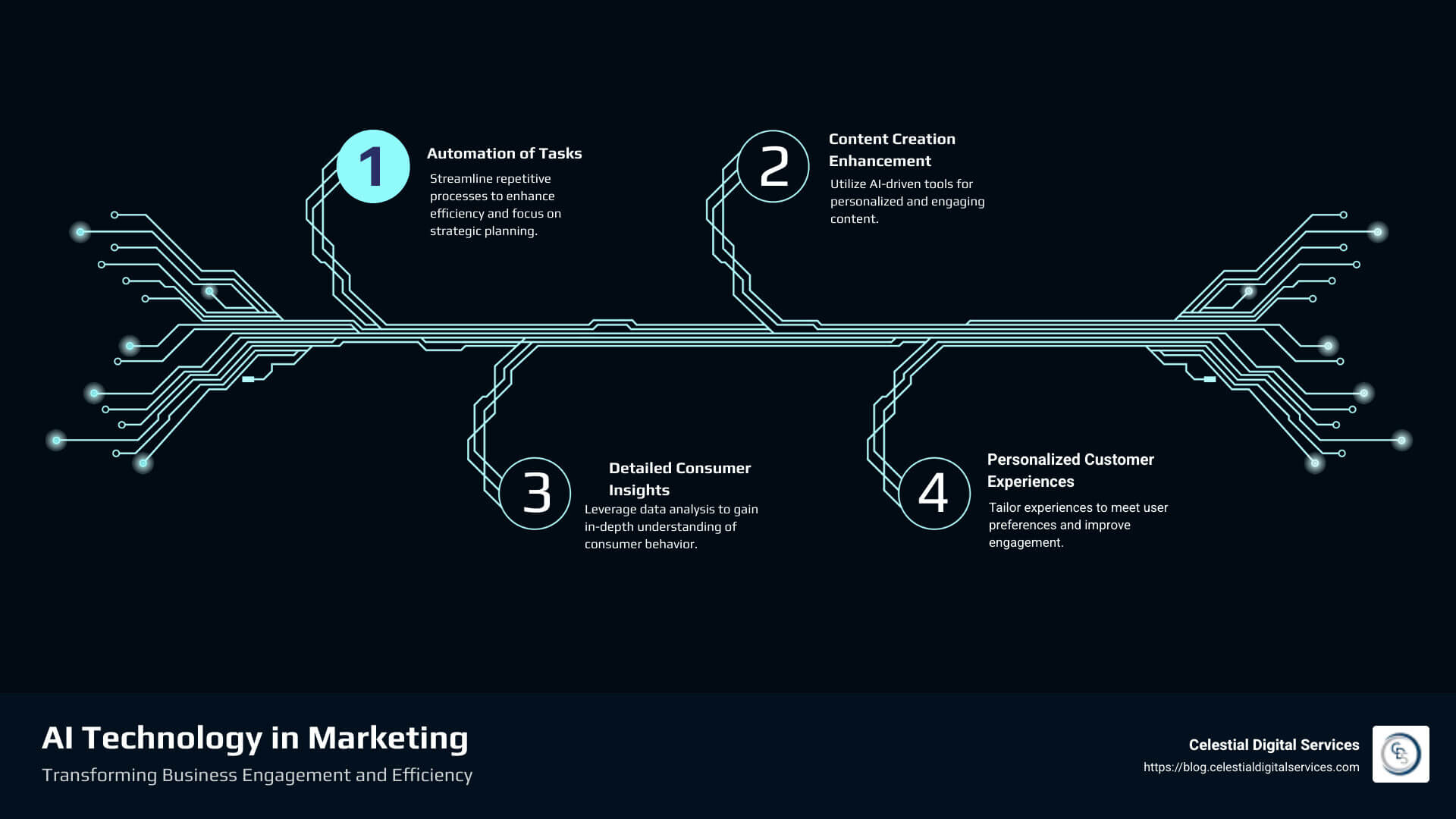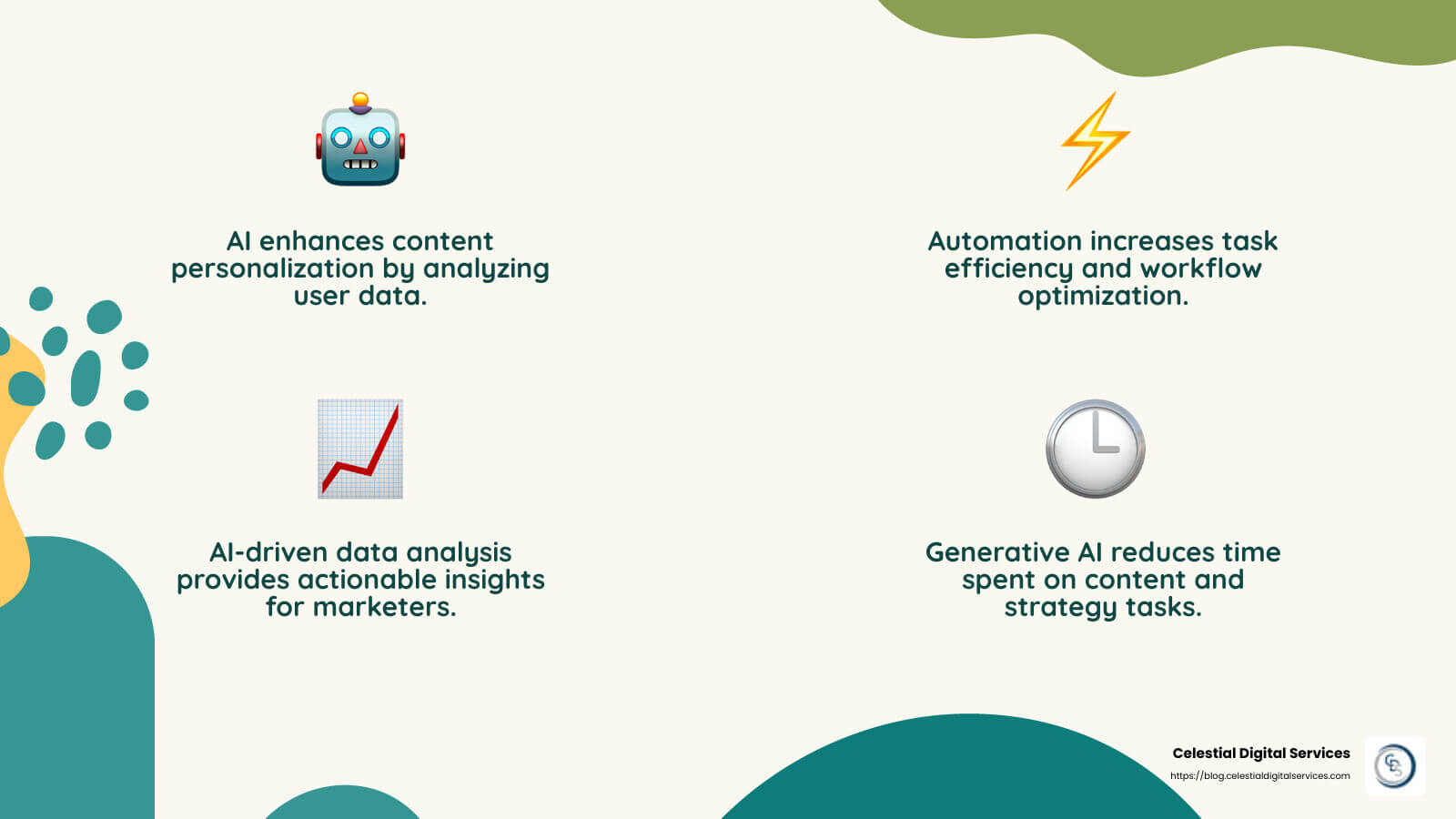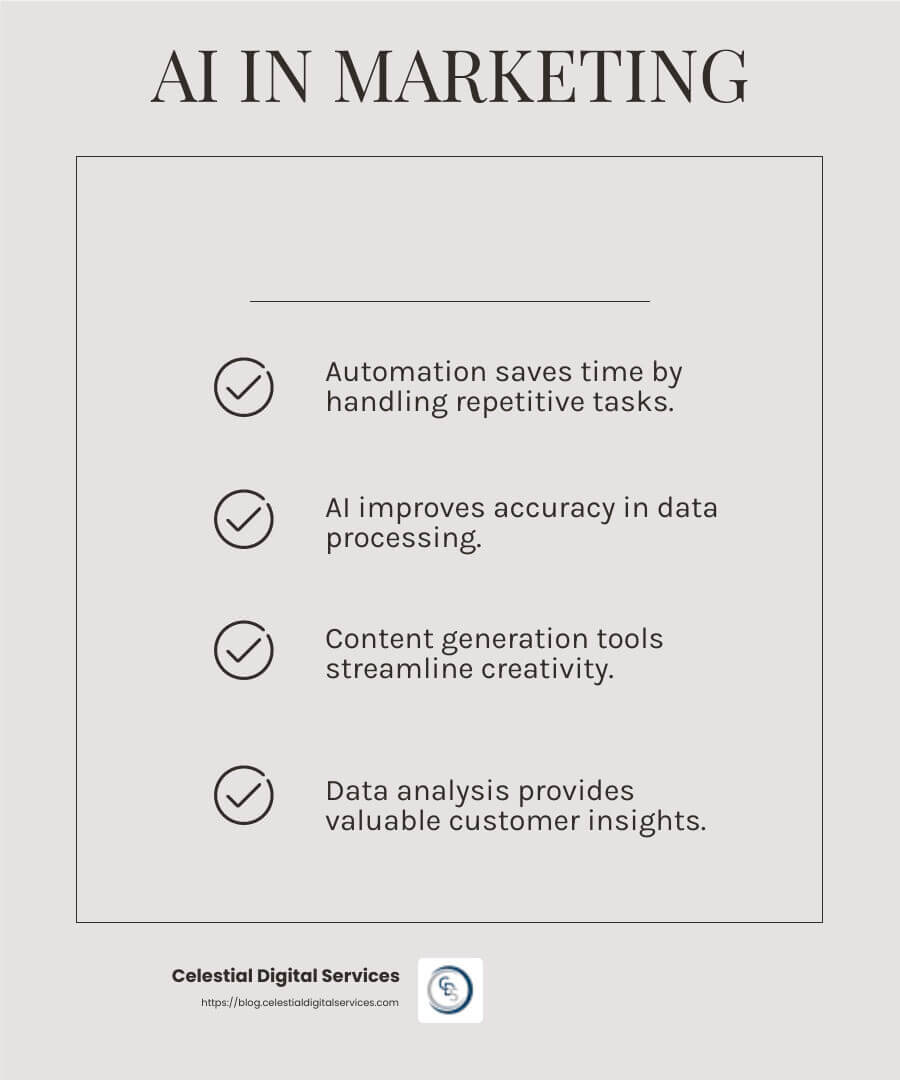In today’s rapidly changing landscape, AI technology in marketing is changing the way businesses reach and engage customers. This tech offers remarkable efficiency and insight by:
- Automating repetitive tasks, freeing up time for strategic planning.
- Enhancing content creation using AI-driven tools.
- Providing detailed consumer insights through data analysis.
- Personalizing customer experiences for improved engagement.
AI tools empower marketers, making processes faster and more accurate, and helping businesses stay competitive.
As you dive into AI technology in marketing, consider this: marketing’s core activities—understanding customers and persuading them to buy—are improved as AI interprets vast amounts of data. This drives smarter decisions, offering a clearer pathway to meeting business goals efficiently.
As someone with a decade of experience leveraging AI technology in marketing, I focus on creating digital strategies custom to unique business needs. This exploration of AI’s potential in marketing will illuminate how these tools can drive growth and optimize your business strategies.

Explore more about AI technology in marketing:
– AI-based customer insights
– AI-powered lead generation
The Role of AI Technology in Marketing
AI technology in marketing is reshaping how businesses connect with their audiences. By leveraging machine learning and data analysis, companies can create content that’s not only relevant but also personalized to individual preferences.
Enhancing Content Creation
Generative AI is at the forefront of content creation. It enables marketers to produce custom content quickly and efficiently. Tools like Jasper.ai and Copy.ai are revolutionizing the way marketers generate copy, headlines, and even entire articles.
- Personalization: AI can create content that resonates with specific audience segments. By analyzing user data, it tailors messages to align with individual interests and behaviors.
- Efficiency: AI reduces the time spent on content creation. Marketers can focus more on strategy and creativity, allowing AI to handle repetitive tasks.
For instance, AI tools can analyze user feedback in real-time, adjusting content to better meet audience needs. This adaptability improves engagement and satisfaction.
Streamlining Operations
Automation is a game-changer in marketing operations. By optimizing workflows, AI technology increases task efficiency and reduces manual labor.
- Task Automation: Repetitive tasks, such as data entry and email sorting, are automated, freeing up time for strategic planning.
- Workflow Optimization: AI tools streamline processes, ensuring that marketing campaigns run smoothly and effectively.
These improvements in efficiency lead to better resource allocation and quicker decision-making. AI-driven data analysis also provides marketers with actionable insights, helping them to predict trends and adjust strategies accordingly.

In conclusion, AI technology in marketing is not just about doing things faster—it’s about doing them smarter. By enhancing content creation and streamlining operations, AI empowers marketers to focus on what truly matters: understanding and engaging with their audience. As we explore further, we’ll see how AI-driven consumer insights can refine these strategies even more.
AI-Driven Consumer Insights
Personalization and Customer Experience
In the field of AI technology in marketing, personalization is a game-changer. AI algorithms analyze consumer data to tailor experiences and interactions based on user preferences. This level of customization improves customer engagement and satisfaction.
-
Predictive AI: By analyzing past behaviors, predictive AI anticipates future actions. This allows businesses to offer personalized recommendations and improve customer experience. For example, streaming services use your viewing history to suggest shows you might like.
-
Data Analytics: AI processes vast amounts of data to uncover patterns and insights. This helps marketers understand customer needs and preferences at a granular level, allowing for more personalized marketing strategies.
Advanced Segmentation Techniques
Audience segmentation is crucial for effective marketing. AI tools improve segmentation by analyzing demographics, behaviors, and psychographics to identify distinct audience segments.
-
Behavioral Analysis: AI examines how consumers interact with products and content. This data helps in crafting messages that resonate with specific groups, increasing the likelihood of conversion.
-
Demographic Insights: AI leverages demographic data to tailor marketing efforts. Knowing the age, gender, and location of your audience can significantly impact campaign success.
These insights allow for more targeted marketing efforts, ensuring that messages reach the right people at the right time. Companies can develop strategies that cater to individual segments, boosting engagement and conversion rates.
AI-driven consumer insights are changing how businesses understand and interact with their customers. By focusing on personalization and advanced segmentation, marketers can create experiences that not only meet but exceed consumer expectations. Next, we’ll explore the tools that are driving these marketing strategies forward.
AI Tools Changing Marketing Strategies
Content Creation Tools
In the world of marketing, AI technology is revolutionizing content creation. Tools like Jasper.ai, Grammarly, and Copy.ai are at the forefront, helping marketers produce engaging content quickly and efficiently.
-
Jasper.ai: This tool uses generative AI to craft compelling copy custom to your audience. Whether it’s blog posts, social media updates, or email campaigns, Jasper.ai streamlines the writing process while maintaining a human touch. Marketers can focus on strategy, knowing that the content is in capable hands.
-
Grammarly: Beyond just grammar checks, Grammarly improves content clarity and tone. It suggests improvements and ensures that your message resonates with your audience. This tool is essential for maintaining professionalism and engagement in your communications.
-
Copy.ai: Known for its creativity, Copy.ai generates unique content ideas and drafts. It’s perfect for brainstorming sessions and overcoming writer’s block, allowing marketers to explore new angles and strategies.
These tools not only save time but also lift the quality of marketing materials. By automating repetitive tasks, marketers can focus on crafting strategies that resonate with their audience.
Customer Interaction Tools
AI is also changing how businesses interact with customers. Chatbots and AI-powered customer service tools have become integral to modern marketing strategies.
-
Chatbots: These AI-driven assistants provide 24/7 customer support, handling inquiries and guiding users through the purchasing process. Chatbots like those powered by AI can manage multiple interactions simultaneously, ensuring no customer is left waiting. They are a crucial component of digital marketing campaigns, gathering data and enhancing engagement.
-
AI-Powered Customer Service: AI tools analyze user feedback to improve service quality. By examining customer interactions, businesses can identify pain points and address them proactively. This leads to higher customer satisfaction and loyalty.
-
User Feedback Analysis: AI processes large volumes of feedback to extract actionable insights. Understanding customer sentiments helps businesses refine their offerings and improve overall user experience.
These AI tools optimize customer interaction by delivering personalized and efficient service. They allow businesses to maintain a consistent and engaging customer experience, which is vital for building long-term relationships.
In conclusion, AI marketing tools are reshaping strategies by enhancing content creation and customer interaction. As we dig deeper into campaign management, we’ll see how AI continues to drive innovation in marketing.
Frequently Asked Questions about AI in Marketing
How is AI used in marketing?
AI technology in marketing is changing how businesses reach and engage with customers. It’s used in various ways, including automation, content generation, and customer insights.
- Automation: AI automates repetitive tasks like data analysis and audience segmentation, freeing up marketers to focus on strategy and creativity.
- Content Generation: AI tools, such as Jasper.ai and Copy.ai, help create engaging content quickly, from blog posts to social media updates.
- Customer Insights: AI analyzes vast amounts of data to uncover patterns and trends, providing valuable insights into consumer behavior and preferences.
What are the benefits of AI in marketing?
AI offers numerous benefits that improve marketing effectiveness:
- Time-Saving: By automating routine tasks, AI saves marketers significant time, allowing them to focus on strategic initiatives.
- Accuracy: AI processes data with high precision, reducing errors and improving the quality of insights and decisions.
- Data Processing: AI can handle vast datasets, extracting meaningful insights that inform marketing strategies and campaigns.

Which AI tool is best for marketing?
Choosing the best AI tool depends on your specific marketing needs. Here are some top contenders:
- Content Creation: Tools like Jasper.ai and Grammarly are excellent for generating high-quality content and ensuring clarity and engagement.
- Video Strategies: AI tools can assist in creating and optimizing video content, enhancing visual storytelling and audience engagement.
- SEO Optimization: AI-driven SEO tools analyze search trends and optimize content to improve search engine rankings, driving more traffic to websites.
Each tool offers unique features that cater to different aspects of marketing. It’s crucial to assess your objectives and choose the tools that align best with your goals.
Conclusion
The AI marketing future is bright and full of potential. As we look ahead, it’s clear that AI will continue to shape the marketing landscape, offering innovative solutions and changing how businesses connect with their audiences.
At Celestial Digital Services, we’re committed to staying at the forefront of this evolution. Our mission is to empower startups and local businesses with cutting-edge digital solutions. By leveraging AI technology, we help businesses thrive in the competitive online environment.
Digital solutions powered by AI are not just about automation and efficiency. They’re about creating meaningful interactions and personalizing customer experiences. AI tools enable us to analyze vast datasets, provide actionable insights, and craft strategies that resonate with target audiences.
As we accept this revolution, we invite you to explore how our AI optimization services can lift your marketing efforts. Whether it’s through improved content creation, streamlined operations, or deep consumer insights, we’re here to support your journey toward success.
In the changing world of digital marketing, staying ahead means embracing innovation. Together, let’s harness the power of AI to create a future where your business not only survives but thrives.



